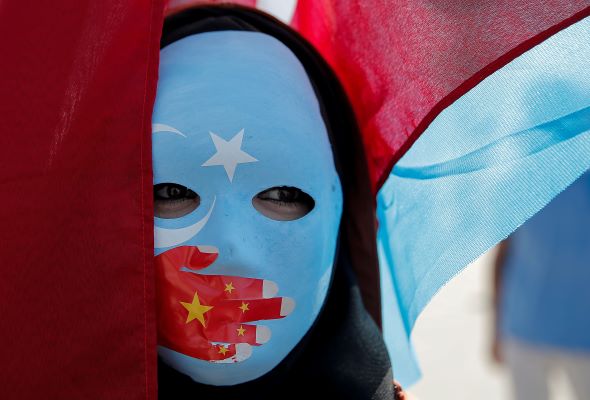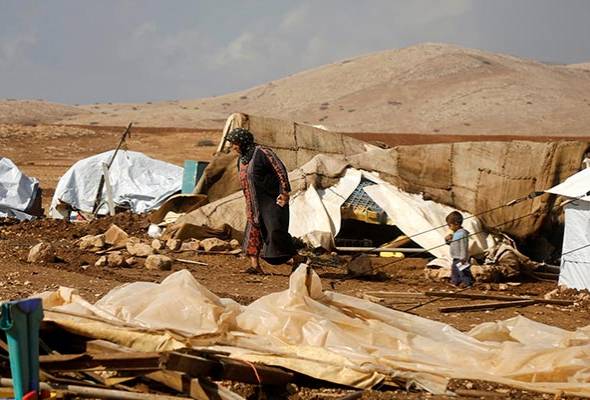
Published in Astro Awani & New Straits Time, image by Astro Awani.
DESPITE China’s denials, evidence and testimonies continue to mount in highlighting the systematic and institutional oppression – often in brutal ways – of the Uyghurs whose culture and religion are in danger of extinction in their very own homeland which gives the lie to their supposedly privileged legal status. Even their de facto second-class status has been exposed as a sham, i.e., much worse than that – despite the propaganda and charm campaign for foreign (tourist, journalistic) consumption.
An expose by the New York Times in 2019 derived from a State document of 403 pages leaked by a Chinese establishment insider revealed that the top leadership had called for the “organs of dictatorship” to be ruthless wielded in the fight against terrorism, extremism, and separatism.
As Lindsay Maizland wrote in an article, “China’s Repression of Uyghurs in Xinjiang” published by the Council on Foreign Relations (CFR), the document “laid the groundwork for the crackdown in Xinjiang”, which included the creation of the indoctrination camps for the purposes of mass detention – so that torture and other forms of inhumane treatment can be meted out without international attention.
According to Maizland, “… many detainees who have since fled China describe harsh conditions. Detainees are forced to pledge loyalty to the CCP and renounce Islam, … as well as sing praises for [C]ommunism and learn Mandarin. Some reported prison-like conditions, with cameras and microphones monitoring their every move and utterance. Others said they were tortured and subjected to sleep deprivation during interrogations. Women have shared stories of sexual abuse, including rape. Some released detainees contemplated suicide or witnessed others kill themselves”.
While Muslim countries that have growing ties with or are beholden to China such as Saudi Arabia and Pakistan, respectively, have been conspicuously silent on the treatment of their fellow religious compatriots, the Western world represented by the US, UK and EU are becoming more aware and vocal, and under growing pressure to act concretely to deal with the issue.
This is unsurprising as the Uyghur exiles and diaspora are active in presenting their case before Western governments and enjoy exposure in the media supported by sympathetic non-governmental organisations (NGOs).
Overseas Uyghurs often back their claims with evidence upon evidence of systemic torture, abuse and deprivation. Many Uyghurs would know someone in the family or extended family and beyond who have been detained and subjected to inhumane treatment by the Chinese security apparatus, most of the time based on suspicion and flimsy grounds.
As reported in The Intercept (Revealed: Massive Chinese Police Database by Yael Grauer, Jan 29, 2021) among others, China is tracking the movement of every Uyghur. Younger generation Uyghurs have been arrested for growing a beard, travelled abroad or even applying for a passport (see “China Uighurs: Detained for beards, veils and internet browsing”, BBC News, Feb 17, 2020).
According to German news portal DW, in May 2017, an Uyghur man was sent away to one of the infamous “re-education” camps in Xinjiang – no charge, no conviction.
His crime?
For being an observant Muslim, his wife covered her face with a veil, and having too many children.
The Human Rights Watch (HRW) in a news report (Dec 9, 2020) has confirmed the existence of Big Data deployment – known as the “Integrated Joint Operations Platform” (IJOP) – by the Chinese government for arbitrary selection of detention. Two lists were procured by HRW, namely the Aksu and Qarakash files, which contained names of detainees who are subject to mental abuse under the pretext of “thought transformation”.
On the Aksu file, HRW note the following: “The entry for “Ms. T” on the Aksu List illustrates how the programme’s algorithms identify legal behaviours as grounds for detention. It notes that she was detained because the IJOP system had flagged her for ‘links to sensitive countries’. It reported that Ms. T had received four calls from a foreign number in March 2017, down to the number of seconds. In other words, the IJOP system is programmed to pick out particular behaviour, calls to a foreign number, noting the precise duration of the calls. [HRW] called that number and found that it belongs to Ms. T’s sister”.
And on the Qarakash file, “… officials also explicitly targeted people for activities that included going abroad, getting a passport, installing foreign software or clicking on a link to a foreign website” (The Guardian, Feb 18, 2020).
Apart from arbitrary detention (extra-judicial disappearances), torture, forced separation and the compulsory sterilisation of the women based on ideological and political considerations, the Uyghur community has to also suffer the ignominy of conscription into forced labour.
In an EMIR Research article, “Forced labour and the on-going systematic oppression of the Uyghurs” (Jan 8, 2021), it’s argued that such ethno-religious profiling under the hegemonic rule of the CCP resulting in “[t]he use of the Uyghurs as forced labour is indeed reminiscent of Nazi Germany’s exploitation of “non-Aryans” such as Jews, Gypsies, prisoners of war from the Soviet Union, Czechs, Poles, etc. In other words, the treatment of the Uyghurs could well reflect a social hierarchy according to ethnicity, region, and other types of ideological classifications.
On Mar 17, 2021, the UK’s Business, Energy and Industrial Strategy Committee of cross-party Members of Parliament (MPs) released their report, “Uyghur forced labour in Xinjiang and UK value chains”. The report compiles news reports, collect evidence from companies in the supply chain and make recommendations in the form of “accelerating proposals to amend and strengthen the Modern Slavery Act 2015, to enhance the transparency and accessibility of modern slavery statements and to develop options for civil penalties in the event of noncompliance” together with the call for targeted sanctions of Chinese and international businesses concerned.
In the US, the Uyghur Human Rights Policy Act/UIGHUR (2020) and the Uyghur Forced Labor Prevention Act (2020) were already passed under the Trump administration.
UIGHUR provides for a statutory duty on the US President, Secretary of State, Director of National Intelligence, and Director of the Federal Bureau of Investigation (FBI) to report to the relevant committees in Congress – Senate and House – for subsequent action in the form of sanctions to be taken.
Under the Uyghur Forced Labor Prevention Act, all goods manufactured or produced in Xinjiang are automatically presumed to be sourced from forced or indentured labour under penal sanctions, unless the Customs and Border Protection (CBP) determined otherwise.
With these legislative weapons in his arsenal, President Joe Biden should be well-poised to exert pressure on China. His public image, however, suffers from his track record of being a “close and reliable friend of China”. Now that since taking office, President Biden has been on record in calling for tougher response to China’s human rights abuses in Xinjiang (see e.g., “Biden says China to face repercussions on human rights”, Reuters, Feb 17, 2021).
Other than that, in his telephone call with Xi Jinping in Feb 2021, he emphasised “the US priority of preserving a free and open Indo-Pacific region” and also “also voiced concern about Beijing’s ‘coercive and unfair’ trade practices and rights issues, such as [the] Hong Kong crackdown, … and increasingly assertive actions in Asia, including toward Taiwan”.
While a “quick-fix” solution is definitively not forthcoming and not something expected by all stakeholders concerned, getting China (directly and indirectly) to roll-back its systematic oppression and repression of the Uyghurs requires concerted international pressure led by the US, now under President Biden.
For now, it’s hoped that by “adding” Xinjiang to the list of China’s “misconduct” in the eyes of the international community, the Chinese Communist party (CPP) would come to the realisation that, all in all, its actions have a subversive impact on regional and world peace and stability, and would therefore take some concrete measures for “self-rectification”.
Jason Loh Seong Wei is Head of Social, Law & Human Rights at EMIR Research, an independent think tank focussed on strategic policy recommendations based on rigorous research.

